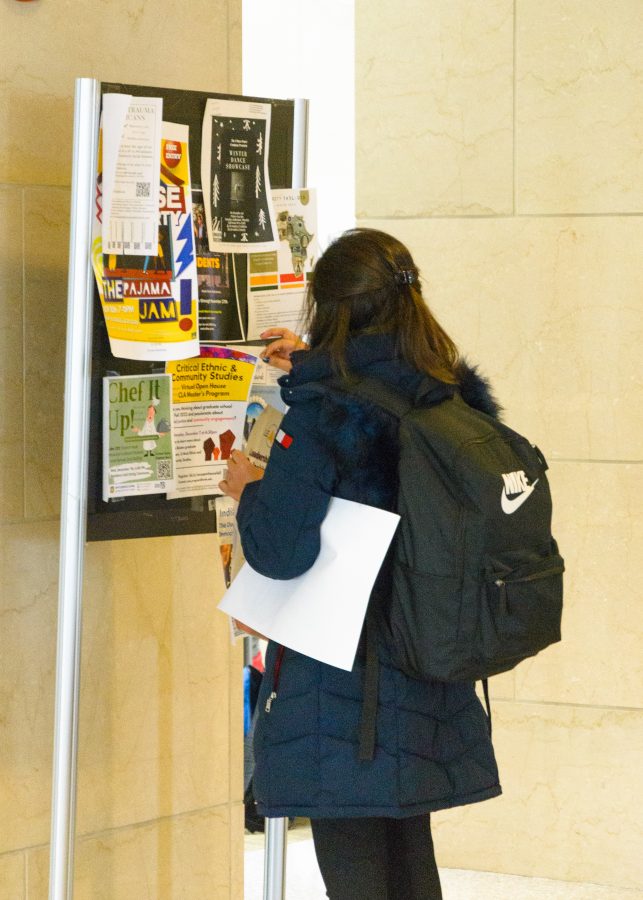Katherine puts up posters in the Campus Center to spread word about on-campus leadership opportunities.
Have you ever taken the time to look over the various posters tacked up to poster boards around campus? If you haven’t, go find some and check them out. What do you notice about them? Consider why you haven’t bothered to check them out before.
It’s probably because they are cluttered and generally not eye-catching.
This is not the fault of whoever may be making them. It’s the fault of the ridiculously bloated and overly restrictive Student Activities poster policy. The people making these posters are just doing the best they can with what they’ve been given—and honestly, some of them do a very good job considering. But the poster policy kills creativity, destroys readability and ends variety.
There are several issues. First, instead of a simple size limit, they give clubs and organizations three very specific sizing options—one simply being the size of a normal sheet of paper. I really think this is one of the main offenses to the whole process. Imagine if we could advertise clubs and organizations with unique, cut-out posters shaped like animals, symbols, food and more! These would be infinitely more eye-catching than the same, boring three sizes of a rectangle.
Second, the requirements for what needs to be on the posters themselves are much too stringent. They make the posters bloated with text, ruining any chance for a decent, eye-catching graphic design. For example, all posters—no matter what for—must include a date, time and location. This is pretty useless and ridiculous because it prevents clubs and organizations from advertising themselves in general without having some event or meeting to advertise. I have seen similar messages as “meeting times to be determined” approved, but this adds unnecessary clutter.
The UMass Boston logo has to be included as well, which is just a pointless and redundant waste of space in my opinion. Additionally, instead of requiring the inclusion of a link to disability accommodation services, a very specific, overly-long sentence is required. This, again, takes up way too much space with text. Contact information in the form of a phone number or email address is also required, prohibiting the usage of a much more space-friendly QR code instead.
All this clutter on the page is just bad design. There’s something to be said about somewhat mysterious and eye-catching posters with simple QR codes that lead to more information. Africana Studies knows this well; their black handprint on a red background, which has been posted all over campus, is a prime example of effective campaigning this way. As great as they are, these posters hint at something really frustrating as well.
Basically, the UMass Boston administration is apparently willing to allow such accusatory posters to forego the normal poster rules in apparent fear of reprisal—as they should, to be frank. However, they don’t seem to have learned anything from them; namely, that posters that aren’t stifled under ridiculously strict guidelines can actually promote real engagement through interesting design.
Another thing the Africana Studies department has, thankfully, been able to pull off is hanging their posters anywhere they like. Now, I don’t think we necessarily should be able to tape up posters just wherever regularly, but I do think that the current options are not enough.
Wheatley and McCormack have big bulletin boards, but Campus Center and University Hall are severely lacking in big, central bulletin boards. The biggest one in Campus Center has been home to a gigantic, outdated poster about administration events from September and early October. This goes directly against at least two major guidelines, and is preventing student organizations, cultural events and more from being prominently displayed.
I know that our Chancellor is, disturbingly, extremely close with the Vatican, but come on…the Catholic high school with insanely invasive rules is down the street, not in the Campus Center. Why is the school stifling our creativity so much?
When talking with the leaders of UMass Boston College Democrats, Ash and Adam, they have expressed serious frustration with the poster requirements. Adam told me, “it’s pretty frustrating for both of us, particularly because it’s annoying to advertise anything that’s not an event,” since dates and times are always required. They’ve also had major issues with the process itself. Ash told me, “they are extremely quick to deny them, but will take days to approve,” which surely is a huge pain, to say the least.
One thing Adam pointed out was that the inability for clubs or organizations to put up permanent advertisements under any situation can cause serious problems with engagement. “Posters get taken down after an event ends, so you can’t actually put up permanent advertisements,” he said. “This type of thing screwed over advertisements for voter [registration].”
The crux of all of this is two-fold. First, campus clubs and organizations become disillusioned with the poster policy due to difficulties with the process, so posters end up quickly thrown together or aren’t put up in a timely manner. This creates bad feelings between clubs and the administration, and creates unnecessary difficulties to deal with.
Second, campus culture is being harmed by lackluster posters and bad poster policies. I asked a few people if they had ever been intrigued or excited by a poster, and most of them said no. Clearly, campus clubs and organizations aren’t able to reach students through these posters the way they should. That’s a big problem. How will student engagement in campus life improve if students aren’t being engaged properly? How are we supposed to encourage sustained engagement if we can’t have semi-permanent posters during key moments in the semester, like elections?
Student Activities really needs to clean up and amend their poster policy. I know it might seem like a minor issue, but I truly believe that it will make a big difference in campus life. I encourage club and organization members and leadership to make their voices heard on this. Contact Student Activities and express your concerns and frustrations. Without feedback, they won’t know there’s a problem.


